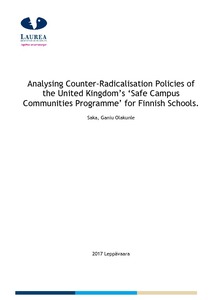Analysing Counter-Radicalisation Policies of the United Kingdom's 'Safe Campus Communities Programme' for Finnish Schools.
Saka, Ganiu (2017)
Saka, Ganiu
Laurea-ammattikorkeakoulu
2017
All rights reserved
Julkaisun pysyvä osoite on
https://urn.fi/URN:NBN:fi:amk-201705229319
https://urn.fi/URN:NBN:fi:amk-201705229319
Tiivistelmä
The study of radicalisation and its countermeasures is relatively new, thus, there are issues and controversies surrounding how best to prevent radicalisation, particularly the threat of violent radicalisation that might emerge from Higher Education Institutions’ (HEIs) environments. In preventing such violent radicalisation in UK universities, the Safe Campus Communities Programme (SCCP) was introduced albeit with skepticisms and criticisms from HEI managers and student groups.
This thesis write-up studies the UK’s SCCP from the perspective of the law, the government, the history of radicalisation and counter-radicalisation in the UK and EU in general, students and HEI managers. It aims to study and analyse the Programme, its setbacks and its successes in preventing violent radicalisation in the UK and in UK HEIs. Aside from this, the write-up intends to explore the possibility of introducing a similar counter-radicalisation programme in Finnish HEIs by analysing how the SCCP’s website functions. Also, a survey of 46 respondents from Finnish Universities of Applied Sciences was conducted to understand how Finnish HEI students perceive such a counter-radicalisation programme for Finnish universities and colleges.
The results from the analysis, survey and findings in this thesis write-up show where there are defects in carrying out the UK’s SCCP, the limitations of the Programme’s website and recommendations on how they can be corrected. It also opens the window to further future surveys and debates on the adoption or modification of such a programme for Finland.
Finally, this thesis write-up exposes the misconceptions about violent radicals and extremists’ state of mind and the perceived conditions that lead individuals to violent radicalisation and extremism.
This thesis write-up studies the UK’s SCCP from the perspective of the law, the government, the history of radicalisation and counter-radicalisation in the UK and EU in general, students and HEI managers. It aims to study and analyse the Programme, its setbacks and its successes in preventing violent radicalisation in the UK and in UK HEIs. Aside from this, the write-up intends to explore the possibility of introducing a similar counter-radicalisation programme in Finnish HEIs by analysing how the SCCP’s website functions. Also, a survey of 46 respondents from Finnish Universities of Applied Sciences was conducted to understand how Finnish HEI students perceive such a counter-radicalisation programme for Finnish universities and colleges.
The results from the analysis, survey and findings in this thesis write-up show where there are defects in carrying out the UK’s SCCP, the limitations of the Programme’s website and recommendations on how they can be corrected. It also opens the window to further future surveys and debates on the adoption or modification of such a programme for Finland.
Finally, this thesis write-up exposes the misconceptions about violent radicals and extremists’ state of mind and the perceived conditions that lead individuals to violent radicalisation and extremism.
